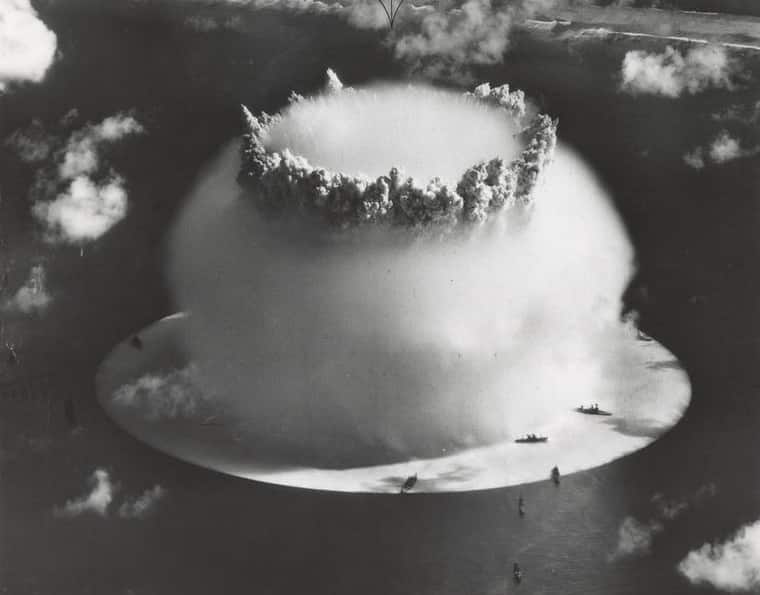Gruber took some of the first color images of Alaska Territory, chronicled plight of World War II refugees
Ruth Gruber found her life’s purpose in 1944 on a ship in Italy crammed with 1,000 Jewish refugees. Most still wore striped concentration camp uniforms. Theirexpressions were sorrowful; their stories, horrifying.
She photographed and interviewed the refugees as they journeyed to America. She promised them that through their stories, America would learn the truth of Hitler’s crimes. “Listening to their stories of survival, I had an epiphany,” Gruber said. “I realized that for the rest of my life I would use my tools – my words and images – to fight injustice.”
The exhibition “Ruth Gruber, Photojournalist,” on view Nov. 2 through Jan. 6, 2013 at the Anchorage Museum, celebrates the 101-year-old’s remarkable life and heroic tenacity through her photographs, filmed interviews and mementos. Images include some of the earliest color photographs of the Last Frontier. Organized by the International Center of Photography in New York, this exhibition is co-presented by theAlaska Jewish Museum, which opens its new facility in February.
Gruber was born in 1911 to Jewish immigrants in Brooklyn. From a young age she began stacking up firsts. At 20, she was celebrated as the youngest Ph.D. in the world. At 24, she became the first news correspondent to travel to a Siberian gulag and conduct secret interviews with prisoners.
In 1941, the federal government hired her to report on conditions in Alaska Territory for potential homesteading by World War II veterans. For 18 months, she focused her lens on Alaska families, soldiers and Alaska Native people. She took some of the earliest color photographs of the Last Frontier.
|
|
But it was on that Jewish refugee ship Gruber decided to devote her life to issues of rescue, sanctuary and liberation. Some of her best-known work was done in 1947 in Haifa, which is now in Israel. She learned a ship overloaded with 4,500 Holocaust survivors had been battered by British destroyers while trying tobreak the blockade on immigration to Palestine.
Gruber was the only journalist to board the Exodus 1947 with a camera. She documented the dead and wounded, and witnessed as refugees were forced to disembark, sprayed with DDT, dispossessed of their paltry belongings and marched onto British prison ships. Wire services sent Gruber’s images to thousands of newspapers and magazines internationally, including Life magazine. These photographs radically transformed post-war attitudes toward Jewish refugees and Holocaust survivors.
Learn more about Gruber’s life and accomplishments at www.jewishvirtuallibrary.org, through the attached New York Times article and through this NPR audio story.
RELATED EVENTS
Sunday Fun Day
Photography
2 to 4 p.m. Sunday, Nov. 4
Focus on photography at this fun family day held in conjunction with the “Ruth Gruber, Photojournalist” exhibition. Go on a museum-wide photo scavenger hunt, explore the exhibition and learn what it’s like to be a news photographer from the Anchorage Daily News’ Marc Lester. Included with admission
Film
Ahead of Time: The Extraordinary Journey of Ruth Gruber
6 p.m. Sunday, Nov. 11
|
|
Take a cinematic journey through Ruth Gruber’s extraordinary life as a photojournalist, activist and author. Learn how she witnessed and made history during a career that spanned seven decades. Presented in conjunction with the “Ruth Gruber, Photojournalist” exhibition. Free
Please note: The film will be introduced by Ruth Gruber’s daughter, Celia Michaels, and the film’s executive producer, Patti Kenner, both of New York City.
(Watch the trailer here.)
ANCHORAGE MUSEUM
The Anchorage Museum is the largest museum in Alaska and one of the top 10 mostvisited attractions in the state. The museum’s mission is to share and connect Alaska with the world through art, history and science. Learn more online at anchoragemuseum.org.





